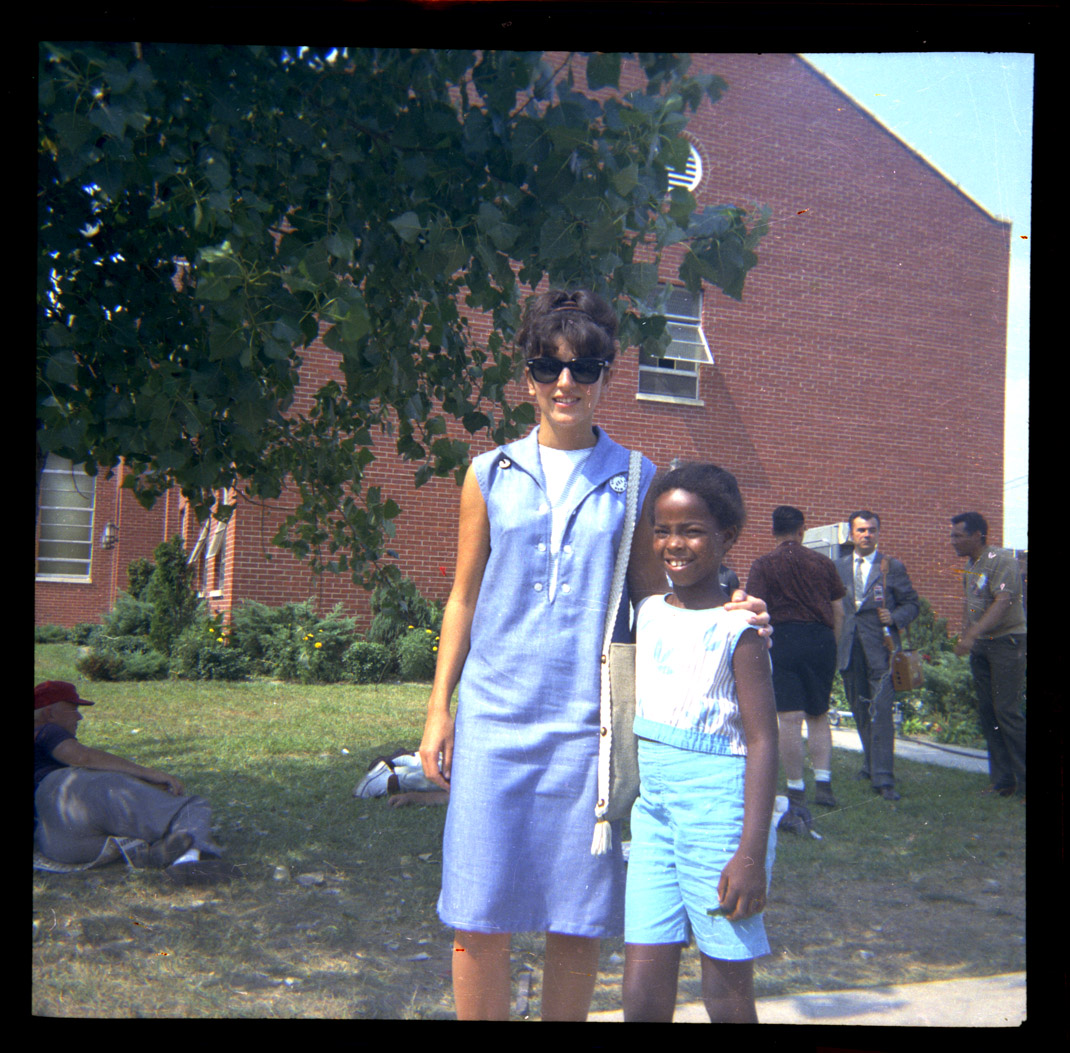Background on Gloria Xifaras Clark

Gloria Clark and student, 1964
From the Mississippi Freedom Summer in 1964 to the antiwar movement and her work in community development in New Bedford, Gloria Clark has lived her activist principles. Born Gloria Maravell in Fitchburg, Mass., the granddaughter of Greek immigrants, Clark was raised with three constants in life: education, music, and a passion for social justice.
Shortly after graduating from high school in 1959 and entering Wheelock College, Maravell's family relocated to New Bedford, where she has made her home ever since. Although she entered college at a time when the civil rights movement was capturing the imaginations of northern students, little in her college life marked her as a future radical. An education major who flirted briefly with a career as a singer, she married an attorney from New Bedford, John Xifaras, during her senior year in 1963. That fall, she began teaching in an elementary school in Dartmouth, Mass. Yet despite having just begun a new life and new career, Clark stepped out of her familiar surroundings into the struggle for civil rights in the deep South.
Like many young northerners, Clark was attracted to the movement through Mississippi Freedom Summer, a project organized by the Council of Federated Organizations (COFO), which included both the Student Non-Violent Coordinating Committee (SNCC) and the Congress of Racial Equality (CORE). As a key component of what was essentially a massive voter registration drive in Mississippi, activists envisioned a network of schools around the state that would both educate and activate. Eventually numbering more than forty, these "Freedom Schools" supplemented traditional elementary and high school curricula with units in African American history, a radical exploration of the socioeconomic and political context of race relations in America, and a call for political engagement.
Clark trained for Freedom Summer in Memphis, Tenn., and was assigned to work in Holly Springs during the summer 1964. While teaching in the Benton County Freedom Schools, she became an organizer for the Mississippi Freedom Democratic Party, expanding her scope from Benton to Tippah and Union Counties, and she traveled to the Democratic National Convention that fall in Atlantic City, N.J., to support the Party. Despite witnessing the violence of the backlash against the movement, including the burning of a Tippah County church whose pastor allowed it to host a speech by Fannie Lou Hamer, Clark remained in Mississippi until January 1965, teaching literacy and African American history, working for SNCC, and organizing the Freedom House Library.
When she finally returned home to Massachusetts, Clark's commitment to the movement stayed true to course. In addition to working for the Friends of SNCC in Cambridge and Boston, she led the newly-formed youth chapter of the NAACP in New Bedford from 1965-1968 and was active in the city in civil rights and voter registration work. As opposition to the War in Vietnam took on an increasing urgency in 1967 and 1968, she immersed herself in the antiwar movement, helping to organize the Vietnam Summer and becoming a leader in the Greater New Bedford Committee to End the War in Vietnam and the Greater New Bedford Draft Information Center. Her return to school to pursue a master's degree in education at Harvard barely impeded her: at Harvard, she took part in the iconic strike of 1969, when students organized by the Students for a Democratic Society (SDS) occupied University Hall, eliciting a furious response from the university president, who demanded their expulsion and arrest, and an even more furious response from the police.
In 1972, Clark moved to England with her new (second) husband Edward Clark and her two young children. In some ways, her three years abroad marked a turning point, though hardly a lessening of her social commitments. Returning home after working as a research assistant in Oxford and an adult education teacher in London, she turned her energies toward community development, working through -- and for -- the city and state governments. Her career included a stint under Governor Michael Dukakis as the Commissioner of the Office for Children in Massachusetts (1983-1986); service as Assistant for Human Services to the Mayor of New Bedford and Director of the Drug Free Community Partnership (1987-1992); and a lengthy term as Executive Director of the Advocacy Resource Center of Greater New Bedford (1992-2005), advocating for the needs of persons with developmental disabilities. As a consultant since, Clark has provided a wide range of services for non-profit organizations, including support in fundraising, grant writing, community needs assessment, and organizational and managerial policy.
As the thirtieth anniversary of Mississippi Freedom Summer wound down in 1995, Clark and several fellow veterans of the civil rights movement organized a large-scale project that resulted in over 50 oral history interviews documenting the movement in northern Mississippi.

